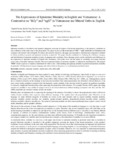Please use this identifier to cite or link to this item:
http://thuvienso.bvu.edu.vn/handle/TVDHBRVT/20705| Title: | The Expressions of Epistemic Modality in English and Vietnamese: A Contrastive on “thấy” and “nghĩ” in Vietnamese and Mental Verbs in English |
| Authors: | Ho, Van Han |
| Keywords: | Epistemic modality Mental state verbs |
| Issue Date: | 2023 |
| Publisher: | https://www.sciedupress.com |
| Series/Report no.: | World Journal of English Language, Vol. 13, No. 5;2023;pp. 231-240 |
| Abstract: | Epistemic modality is described as the speaker's judgment, assessing the degree of the factual proposition, or the speaker's confidence or non-confidence in the truth value of the proposition. The paper focuses on the expression of “thấy”, “nghĩ” predicates in Vietnamese and compares with mental verbs in English. To achieve the research objectives, the paper uses descriptive, statistical and comparative methods to clarify modality in general and epistemic modality in particular. The paper initially contributes to clarifying the definition, category, and identification of epistemic modality in terms of grammar and vocabulary. Next, the paper points out the similarities and differences in the expression of epistemic modality in English and Vietnamese. The results show that the nature of vocabulary and syntax basically exists value of factuality and non-factuality. The most important feature of epistemic modality is subjectivity and objectivity. The speaker "I/Tôi" clearly expresses or implies commitment for what is said. Understanding and applying modality in general and epistemic modality in particular will help learners acquire language and culture better in the process of communication and translation |
| URI: | http://thuvienso.bvu.edu.vn/handle/TVDHBRVT/20705 |
| ISSN: | 1925-0703 |
| Appears in Collections: | Ngoại ngữ - Khoa học xã hội (Articles) |
Files in This Item:
| File | Description | Size | Format | |
|---|---|---|---|---|
| Han-van-ho-T2-23.pdf | 493,3 kB | Adobe PDF |  Sign in to read |
Items in DSpace are protected by copyright, with all rights reserved, unless otherwise indicated.